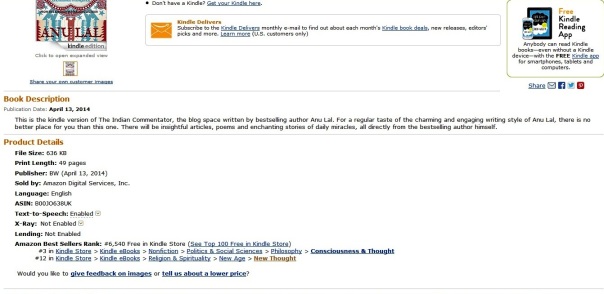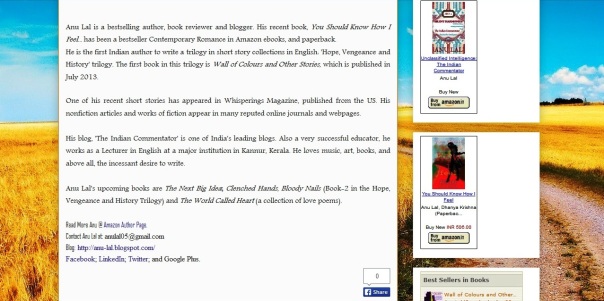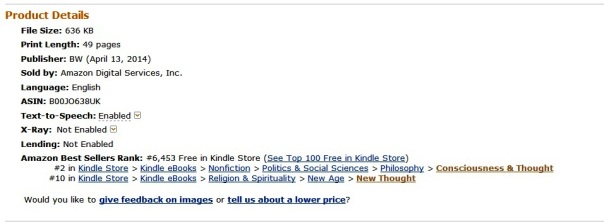
Courtesy: Google Images
What makes the writer in you smile? The money involved in the writing business or the chance to serve humanity through the words you write? I know the money part doesn’t hurt the majority of us, but by any standard very difficult to come by on reliable amounts, doing writing as a day job. So what is your motivation for staying in this profession?
Bestsellers and Moneymaking:
Ray Bradbury, author of Fahrenheit 451, in one of his writing tips suggests that one should not fix one’s attention on moneymaking while plodding through the journey of being a writer. However, with success stories like Hugh Howey and Amanda Hocking flying around in the media around us, none of the wannabie writers would possibly prefer to feign ignorance towards the “money-making” aspect of writing. This, indeed, is the catch in being an indie publisher. I hope the people in BW Publishing wouldn’t disagree with me. If they do, you wouldn’t be reading this piece right now. If you are reading this part, believe me, they are a bunch of very nice people, kind and all. But each time a writer attempts self-publishing, those few glittering names might serve a tantalizing example for them to try it out at least once. This is the same reason why when my second book, You Should Know How I Feel, went into Amazon’s top-hundred bestselling contemporary romance list, I couldn’t sleep the whole night. I was excited, of course.
Being a bestselling author is not as financially liberating experience as winning a lottery. It takes time before you make awesome lots of money. Being a bestseller currently, is a responsibility than anything else. It is a status quo, according to which people expect you to act, at least in your future writing endeavors. In that sense, it gives the writer a definite advantage. There is both visibility and a chance to look at oneself with confidence. Seeing one’s book in the bestseller list, of course raises one’s confidence levels. However, as I mentioned, it is not easy to earn a living by writing bestsellers any longer. One must keep a day job in order to experiment with a dream like ‘being a writer’. It is an experiment basically, which you are sure to win. But it also depends on how you define ‘victory’.
This is where Mr. Bradbury’s words help us. If a writer’s focus is awards, and if one fails to secure a position in a prestigious short list for a great award, the writer fails. If a writer’s focus is on bestseller lists and money, and if one fails to make that happen in the expected attempt, the writer fails inevitably, again. The choice is simple; do you wish to be a failure in selling or a failure in writing?
If you wish to avoid being the latter, your focus should be on writing, not on selling. It is an extremely workable tactics, which most of us in the kindle-era are yet to trust. Cover design and marketing are important factors in publishing a book. However, the most important element that makes a book is its ‘life force’, the content. Much like human beings, every book has its own life force, its own soul. It is to tend and nourish the content, its soul every writer must strive each moment. This puts upon the writer the added responsibility to play God with the story. Like the invisible Creative Source of the universe and the way it tends and nourishes the human spirit, a writer must feed the content of every book with love and grace.
Faith plays a crucial role in this attempt. I am sure every writer reading this article would be wondering where I am driving at with these spiritual interpretations for the art of writing. I would suggest that there is an added advantage to this perspective. If, as a writer your focus is on good writing and strong content, each attempt will take you a little up the ladder to the fulfillment of your dream. When you armor yourself with this perspective, you abandon the risk of trailing off in this bestselling list or that. This doesn’t mean I am belittling the importance of bestsellers. Instead, I am stressing the importance of providing quality content irrespective of your place in the list. Being noticed is just the side effect. After each work, your expertise as a writer will grow and so will your authenticity. But this could happen only if you would spend your energies in the perfecting of your craft and not over worries on acceptance by the populace.
What others think of your craft should not be the marker of your success. If it were, you would never be able to make it big, for every bestseller-performance invites attention. The more attention, the more criticism. In fact, practicing the art with unshared attention of the author would be a definite upper hand in your life in the post-bestseller period. You would be unaffected with negative or positive criticisms by others and be a writer with a steady growth if you follow your inner call rather than what this critic or that critic thinks. Thanks to the spiritual perspective. This would work in your favor once you start mounting the stairs of success.
Service and the Spirituality of Writing:
At this level, it must sound like a mission. The central concept of our discussion is writers’ motivation. Should it be money or the craft itself? We have already seen that giving too much importance to money and rank could jeopardize the very life force of your work, the craft, and this increases the risk of failure as a writer. Instead, if one spares undivided attention at the Glorification of Craft, there is a win-win situation in store for the writer. You will know each time that you are learning something important in terms of ‘how to tell a better story’.
This is where one comes across the duality of reader and writer, because you are “telling something”. In order to tell something, you need someone across you to listen. However, the motivated writer should be in harmony with the Constant Reader, a terminology popularized by Stephen King, and not the money they are receiving as royalty. Storytelling and writing in general are acts that involve the undeniable dualism of the reader and the writer. This makes it a writer’s duty to give back one’s best to the Constant Reader. Giving the readers a treat with the best content, you could involve in the creative process without thinking about rewards.
Rewards, you should take for granted, for they in a dedicated writer’s life make themselves bountifully present. Dedicating one’s craft to the service of humanity in taking the reader away into another world for escape or to impart a new idea into their minds, is a useful pretext to work regardless of the monetary reward. This is a set of regular exercise, which can help writers achieve the Glorification of Craft.
Giving away books free, without any additional cost is an advantage of electronic publishing and a positive, selfless gesture towards the reading community. With Amazon Kindle’s Free Book Promotion tools, it’s even easier for indie authors to chose when and which book they would like to give away free of cost. From July 5 to 7, the Kindle version of my blog The Indian Commentator with a special authors’ note is available free. Because my readers have given me so much support through BW Publishing and through Amazon’s sales channels, I consider this my thanksgiving gesture, to return something back to them. Art always attains higher meaning through service.
Free e-books are generally a marketing strategy that many traditional publishers are reluctant to take. However, when I suggested the idea, BW Publishing was very impressed and was ready to make a kindle version of my blog. They did it with impressive quality. There is no revenue intention behind this attempt. I thank my publisher for extending this warm gesture of friendship and service not just towards me but also to all the clan of my readers.
What gives me real joy is not the number of bestselling charts this book is climbing currently, but the fact that I am giving something back to the reading community, free of any financial burden. Moreover, I am receiving the satisfaction and contentment that I envisioned through the practicing of the spiritual perspective of writing or the viewing of writing as “tending of the life force” of the creative work. These are rituals that can ground the writer in writing for higher levels of excellence rather than superfluous gains.
With love,
ANU LAL
Download Unclassified Intelligence, the kindle version of The Indian Commentator here, free.
UNCLASSIFIED INTELLIGENCE.
Anu Lal’s latest book Prabuddha: The Clear-sighted is now out on sale. Get a copy here
















